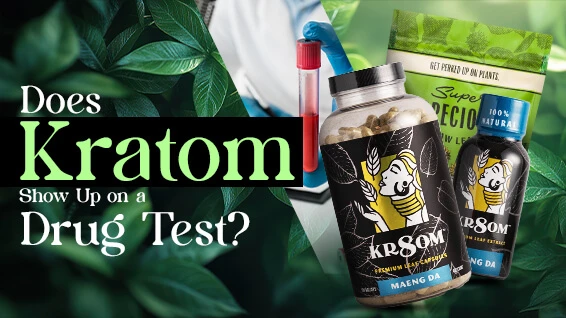Long ago, Mitragyna speciosa (kratom) originated in Southeast Asia, where it was revered for its psychoactive properties. It has been used by many communities almost ritualistically. With time, people discovered that it has the potential for wellness, and its usage increased.
Not long ago, kratom started gaining popularity in the United States as a natural remedy for mental and physical discomfort. With the increasing attention it began to get, concerns popped up, and one of them was: “Will kratom show up on a drug test?”
It is important to understand how kratom interacts in drug tests. Those who work in medical or legal fields or are preparing for employment will find this information crucial.
Understanding Kratom
Kratom is a tropical tree native to the Southeast Asian region. It is prevalent in countries like Indonesia, Malaysia, Thailand, and Papua New Guinea. For centuries, the leaves of this plant have been used traditionally by healers as energy boosters and discomfort relievers. Many use it to uplift mood.
Traditionally, the leaves were consumed whole or made into tea. Now, with technological advancements, kratom is made into different products like capsules, powders, and extracts.
Kratom is rich in Alkaloids, with mitragynine and 7-hydroxy mitragynine being the most common. They interact with the brain’s opioid receptors and produce stimulant- or opioid-like effects.
- Mitragynine: Mitragynine is the primary alkaloid in kratom. In low doses, it interacts with receptors, stimulating the brain and enhancing energy and mood.
- 7-Hydroxymitragynine: While it is another important alkaloid in kratom, it is stronger but not as widespread. It binds to the opioid receptors in the brain, helping manage discomfort.
Whether you experience relaxation or energy boosts depends on the dosage. At low doses, you are likely to experience stimulating effects, and at low doses, kratom will be more effective in supporting discomfort relief.
Now, let’s discuss the drug tests to understand if you should be worried before one.
Different Drug Tests
Drug tests are of different types and have various measures to detect substances. The most common screening for drugs is urine analysis. Blood tests check for the substances present in the bloodstream, which can indicate recent drug use. But will they detect kratom? It depends on the test and its detection meters.
- Urine analysis is used to detect recent drug use.
- Blood tests measure the amount of substances in the blood, which is ideal for detecting recent use.
- Hair tests are used to identify long-term use of up to 90 days.
- A saliva test is easy to administer and looks for recent use.
What Do These Tests Detect?
Standard drug tests are designed specifically for amphetamines, benzodiazepines, cocaine, marijuana, and opioids. Kratom is not explicitly on the list. Tests detect:
- Specificity: Locates specific drugs
- Sensitivity: Detects small substance quantities
The Time Before Chances of Detection Decreases
Detection time for amphetamines, benzodiazepines, cocaine, marijuana, and opioids varies depending on different factors like dosage, usage frequency, user metabolism, and the specific drug test. Let’s look at general detection windows based on substances and tests.
Substances
- Amphetamines: 1-3 days
- Benzodiazepines: 1-7 days
- Cocaine: 1-4 days
- Marijuana: 1-30 days
- Opioids: 1-3 days
Tests
- A urine test can detect the presence of kratom for 1-9 days after the last use. However, dosage and frequency could increase or decrease this window.
- Blood tests can detect kratom for up to 24 hours.
- Hair tests are intensive and can detect kratom for up to 90 days after the last use. This test is uncommon.
- A saliva test can detect kratom in the saliva for 1 to 4 days. It’s a non-invasive and easy test.
How to Minimize the Chances of Detection?
Hydration: Drink plenty of water and eat good food to keep your metabolism functioning optimally, which can help flush out kratom and reduce detection time.
Detoxification: The easiest way to avoid detection is to abstain from kratom consumption before tets. Detoxify by drinking water and exercising to accelerate the elimination process.
Track Time: The more time has passed since your last kratom use, the better your chances are of running negative through a drug test. If you have a hair test coming up, avoiding kratom for a few months can help you clear out.
You can combine these tips to improve your chances of getting through a drug test without worries. However, if you prefer detox products or other methods, consult with a healthcare professional for personalized advice to ensure safety.
Conclusion
Kratom offers potential wellness benefits, such as stress and discomfort relief and vitality replenishment, but its interaction with drug tests necessitates understanding every aspect of kratom and drug tests to ensure you are on the safe side.


